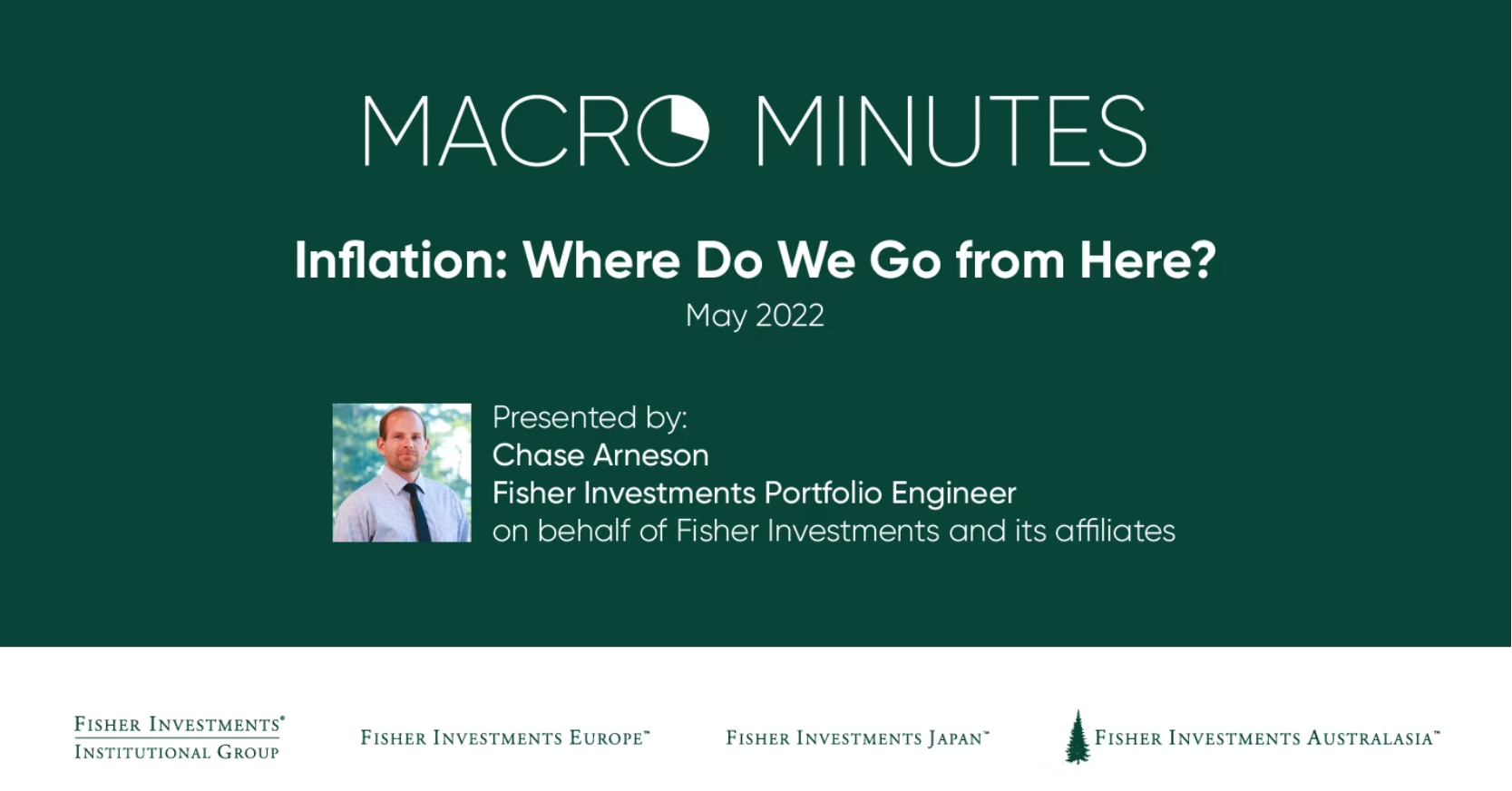Institutional Investing / Macro Minutes
Macro Minutes: Inflation: Where Do We Go from Here?

In May’s Macro Minutes video, Fisher Investments’ Portfolio Engineer Chase Arneson discusses inflation, focusing on the unique set of circumstances that have contributed to its recent rise. He explains why we believe those drivers are unlikely to continue and why inflation will likely moderate.
Key Points
- COVID lockdowns caused an extreme shift from consumers mostly spending on services to focusing on goods.
- The shift in consumption caused inflation in goods, leading to goods accounting for most of the increase in core inflation. But, we believe goods inflation will likely moderate going forward.
- While wage growth could stay strong, this does not necessarily mean total inflation must also rise.
Transcript
MACRO MINUTES opening appears with a title “Inflation: where do we go from here?”. Below is a small image with a guy wearing a light-blue shirt with navy blue tie, The video is present it by Chase Arneson Fisher Investments and Portfolio Engineer on Behalf of Fisher Investment and its affiliates
[Music]
Chase Arneson appears on the screen wearing glasses, a navy suit and sitting in a library.
Chase Arneson begins to speak, introducing Himself and move on with the topic.
Chase Arneson: Hello, my name is Chase Arneson and I'm a portfolio engineer here at Fisher Investments. Today I'm going to talk to you about inflation, specifically the extremely unique set of circumstances and items that have contributed to its recent rise, why we believe those drivers are unlikely to continue looking forward, and in our view, why inflation is likely to moderate from here.
Screen shows a chart with a title “CONSUMPTION SHIFT ADDING TO INFLATION” The chart seems to explain how COVID altered the inflation
Chase Arneson: As we are all painfully aware, COVID and the associated lockdown significantly altered everyday life for nearly everyone, and consequently also uniquely altered the way consumers spend their time and money. This chart here shows you just how extreme the change was as consumers dramatically shifted from mostly consuming services as a percent of total US. Expenditures, to focusing on goods consumption. Perhaps there are some consumer spending habits that remain sticky as the world continues to reopen. But we don't believe there is any fundamental cause for this shift to remain permanent and would expect it to normalize over time, as it already has been. This matters to inflation. As I'll show you on the next slide
Screen shows the second slide of the chart with a title “RECENT INFLATION FULED BY GOODS”
The chart seems to explain when the inflation increases and decreases
Chase Arneson: here, I'm showing you core year over year CPI broken down into services and goods. You can see while services inflation has been increasing, what is really unprecedented has been the inflation in goods. An economic principle I know to be true is demand moves faster than supply in the short term. Thus, the unique nature of the COVID lockdowns caused surge in goods demand as people were stuck at home with supply, struggling to catch up. Now, given a long enough period, Adam Smith's invisible hand concept tells us that this would naturally balance itself out over time, but we believe it'll be helped along even further by consumer demand shifting back to services, which we're already seeing evidence of. I also think it's interesting to note if you look at this chart and focus on the period before COVID lockdowns, you'll notice that goods have generally been a deflationary force over the last two decades or so. So, while there are arguments that perhaps that could change going forward due to trade uncertainties with major manufacturing countries, we don't view that as the most likely outcome. And in our view, it's extremely unlikely goods inflation can sustain these levels and see moderation as the highest probability.
Screen shows another slide of the chart with a title “CORE CPI LIKELY SLOWS AS BOTTLENECKS EASE”
The chart seems to explain major components that has contributed to month over month core CPI growth.
Chase Arneson: In some ways, CPI is just a simple math problem and looking at the components can be very telling. I'm showing you here major components that have contributed to month over month core CPI growth. A couple of items stand out here. If you read this chart from left to right, starting with the pre COVID lockdown world, you'll see that housing was the most consistent and largest contributor to core CPI growth. Transportation and other services would also generally contribute, but beyond that, most items were fickle. But post lockdowns extremely small items begin to have outsized impacts, most notably used cars indicated in green. Now note that used cars are only a5% weight in the core CPI bucket. So, in order for used cars to be contributing 2030or even 40 basis points to core month over month inflation, you have to have some wonky circumstances going on. And as noted before, from a combination of the invisible hand working its magic and consumers shifting back to services, we think it's unlikely you continue to have such outsized month over month jumps like we have seen. So, while items like housing probably remain a consistent contributor to inflation, used cars and other goods likely moderate, if not even outright become a detractor going forward. Second point is we are looking at month over month core CPI here. Of course, year over year CPI gets most of the media headlines. Up until now, the year over year comps have been pretty low. But beginning in April, the comps will begin to get much more difficult as we begin to lap those spikes in 2021, which likely also helps to moderate year over year inflation prints.
Screen shows another slide of the chart with a title “RISING WAGES DOES NOT NECESSARILY MEAN RISING CPI”
The chart seems to explain major components that has contributed to month over month core CPI growth.
Chase Arneson: One question we often get is if consumption goes back to services and we already have a tight labor market, won't rising wages drive inflation even higher? Not necessarily. In our view, the wage effect on inflation is most apparent in domestically insulated markets such as services and housing. However, the pace of activity in global manufacturing markets has a greater impact on the pricing of internationally traded goods. Because of this phenomenon us. Wage growth and us. Inflation often diverges from each other when manufacturing PMIs. Decelerate what I'm showing you here on the top chart is US.CPI and us. Wage growth. The Red Arrows are calling out various times in history when the two have diverged, with total US.CPI growth decelerating, while wages stay elevated or even rising at the same time. Notice this generally happens when the manufacturing side of the economy slows, which is demonstrated by PMIs on the bottom chart. Given the cyclical nature of manufacturing, it is quite normal for this slowing to happen multiple times in the midst of a bull market. We believe we are in one of those periods of normalizing growth following the sharp rebound we experienced coming out of lockdowns, likely making falling inflation but strong wages a very plausible scenario.
Screen merges into Chase Arneson’s section while he continues to explain the charts.
Chase Arneson: Looking forward, rolling all this up, we see decelerating inflation growth from here as the most likely outcome over the medium to long term. This likely has a number of positive effects on the economy, helps to lower long term interest rates, and also gives the Fed some breathing room, which likely also decreases the chance of a policy mistake from the Fed. Thanks for watching, and if you have any questions, please reach out to your relationship manager.
Thank you for watching! If you would like to learn more about our views, please reach out to your relationship manager or email FisherInstitutional@fi.com
Investing in Financial Markets Involves The Risk of Loss and There is no Guarantee that all or any capital invested will be repaid. past performance neither guarantees nor reliably indicates future performance, the value of investments and the income from them will fluctuate with world financial markets and international currency exchange rates.
The information in this document constitute the general views of Fisher Investments and its affiliates and should not be regarded as personalized investment advice or a reflection of the performance of fisher Investment or its clients. we provide our general comments to you based on information we believe to be reliable. there can be no assurances that we will continue to hold this view; and we may change our views at any time based on new information, analysis or Reconsideration. some of the information we have produced for you may have ben obtained from a third party source that is not affiliated with Fisher Investment. Fisher Investment requests that this information be used for your confidential and professional use. Data is month end and USD unless Stated otherwise.
Fisher Investment
Fisher Asset Management, LLC, Doing Business as Fisher Investment (FI) is an Investment adviser Registered with the US Securities and Exchange Commission. As of February 28, 2022, Fi Managed Over $192 Billion, Including assets sub-Managed for its Wholly-owned Subsidiaries.
Fisher Investments Ireland
Fisher Investments Ireland Limited (FII), an Irish private Limited Company, is Registered, along with its trading name, Fisher Investment Europe, With the Companies Registration office in Ireland (#623847 and #629724), and is regulated by the Central Bank of Ireland, with its registered address at: 2nd Floor, 3 George’s Dock, International Financial Services Centre, Dublin 1, D01 X5X0, Ireland. FII is Wholly-owned by Fisher asset Management, LLC, trading as Fisher Investment (FI), Which is Wholly-owned by Fisher Investment, Inc. FII outsources Portfolio Management to FI, FI’s Investment Policy Committee is responsible for all strategic investment Decisions. The Fisher Joint Investment oversight Committee is Responsible for overseeing FI’s Management of portfolios that have been outsourced to FI. This Material may also be found posted on the FII website at Institutional.fisherinvestments.com/en-ie. if you firm wishes to be removed from receiving these Materials in the future or wishes to pay for this material. please contact FII. This material has been approved and is being communicated by FII.
Fisher Investment UK
Fisher Investments Europe Limited (FIUK) is authorized and regulated by the Financial Conduct Authority (FCA #191609), Trades Under the name Fisher Investments Europe, and is registered in England (Company #385093). FIUK is Wholly-owned by Fisher Asset Management, LLC, trading as Fisher Investment (FI), Which is Wholly-owned by Fisher Investment, Inc. FIUK outsources portfolio Management to FI. FI’s Investment Policy Committee is responsible for all strategic investment Decisions. The Fisher Joint Investment Oversight Committee is Responsible for overseeing FI’s Management of Portfolios that have been outsourced to FI. this Material may also be found posted on the FIUK website at institutional. Fisher Investments | Wealth Management Company. if your firm wishes to be removed from receiving these materials in the future or wishes to pay for this material, please contact FIUK. this material has been approved and is being Communicated by FIUK.
Disclosures
Fisher Investment Australasia
Fisher Investment Australasia Pty Ltd (FIA) (ABN 86 159 670 667, AFSL 433312) Provides Services To Wholesale Clients only. FIA is Wholly-owned by Fisher Asset Management, LLC, Trading as FI, Which is Wholly-owned By Fisher Investment, Inc. FIA Delegates Portfolio Management To FI. Thi Material is Designed for use with Wholesale Prospects and Clients as Defined under the Corporation Act 2001. it is provided for information only. It is not an investment recommendation or advice for any specific person. Although it is based on data provided to FIA that is assumed to be reliable at time of writing, the accuracy of the data cannot be guaranteed. Investments involves risks. Past performance is no Guarantee of future returns nor a reliable indicator of future returns. Neither FIA, nor any other person, Guarantees the investment performance, earnings, or return of your investment. Opinions expressed in this analysis are Current only at the time of its issue. We may change our views at any time based on the new information, analysis or reconsideration. Forward looking statements (including Statements of intention and projections) are based on current expectations, assumptions and beliefs and involve risks and uncertainties. All these factors may cause actual outcomes to be materially different. To the Maximum extent permitted by law, Neither FIA nor its directors, employees or agents accept any liability for any loss arising from reliance on this analysis.
Fisher Investments DIFC
Fisher Investments, DIFC branch (FI DIFC) is regulated by the Dubai Financial Services Authority (DFSA) and is Authorized to Conduct Business with Professional Clients or Market Counterparties only as Defined by the DFSA.
Fisher Investments Japan
Fisher Investments Japan (FIJ) is a branch of fisher Investments Japan Limited and is registered as a Financial Instruments Business Operator with the Japan Financial Services Agency Under Director- General of Kanto Local Finance Bureau (Financial Instruments Firm #2766), and is a member of Japan Investment Advisers Association. FIJ was established in Tokyo. Japan in 2015 as a wholly-owned subsidiary of FI. FIJ serves as the investment Manager, and delegates a Portion the investment Management Function To FI subject to the oversight of the FIJ portfolio Engineer. FIJ provides discretionary investment management service to clients in Japan.
[Music]
See Our Institutional Insights
Stay on top of the latest investment trends and developments with our views and research.






